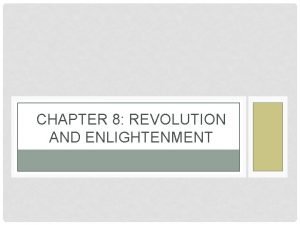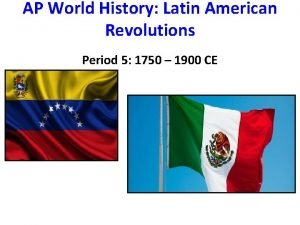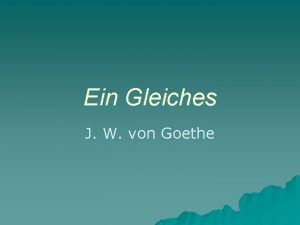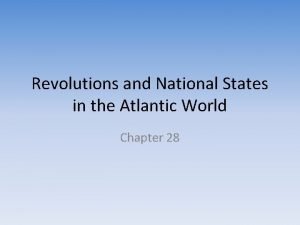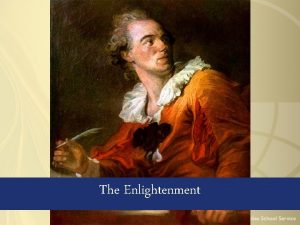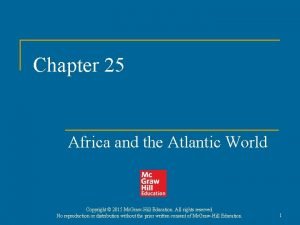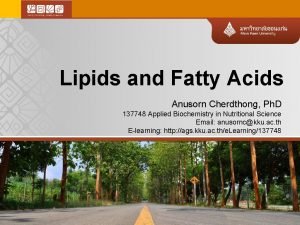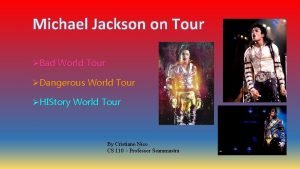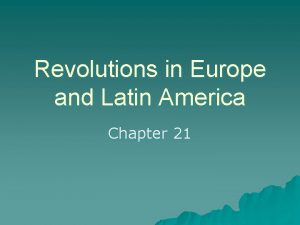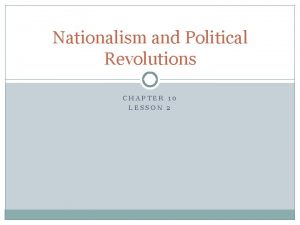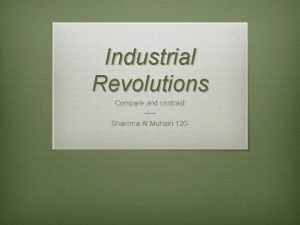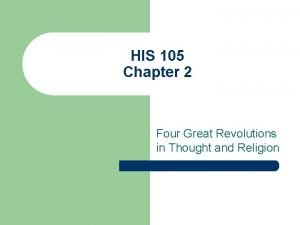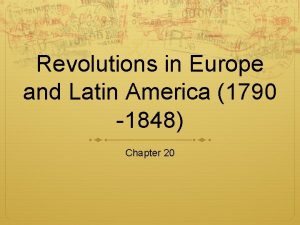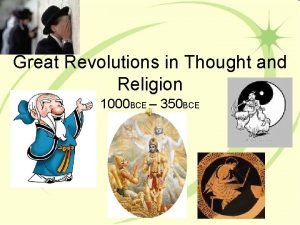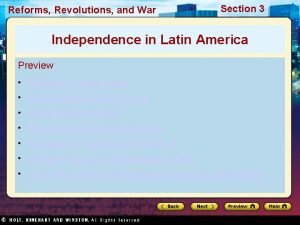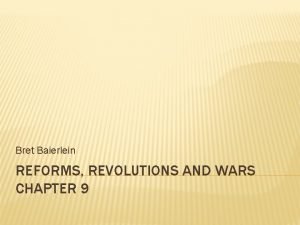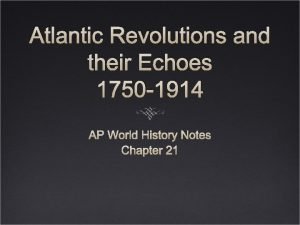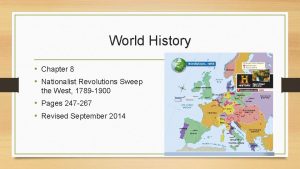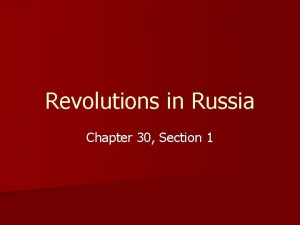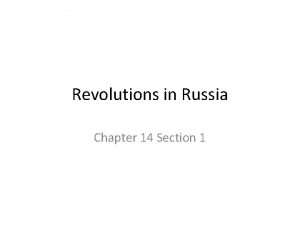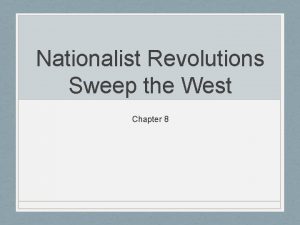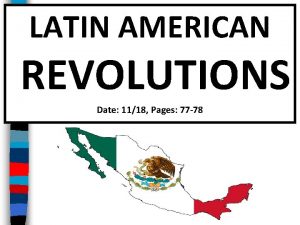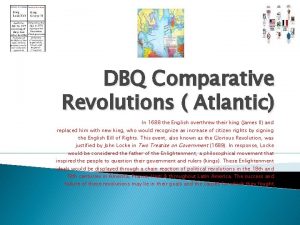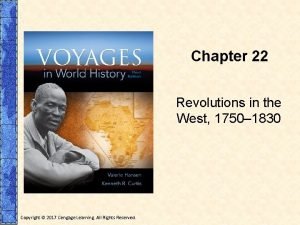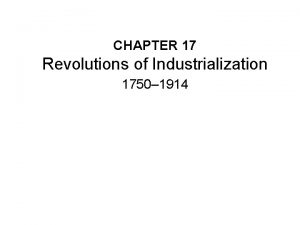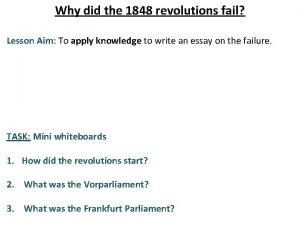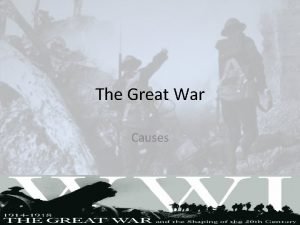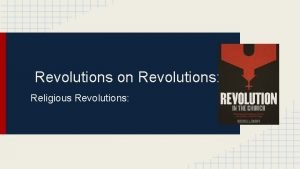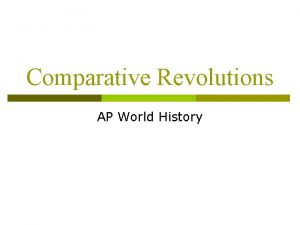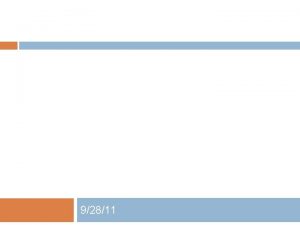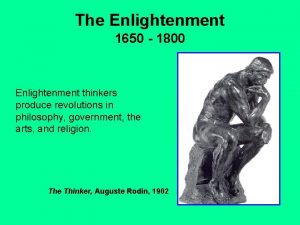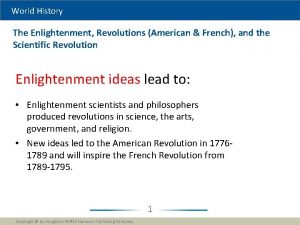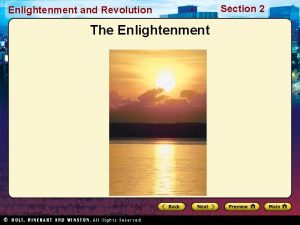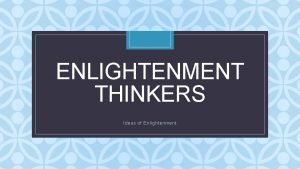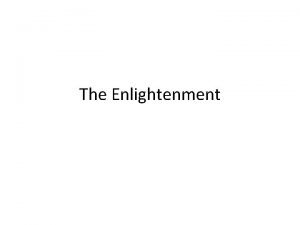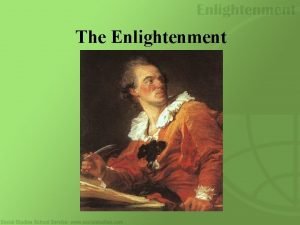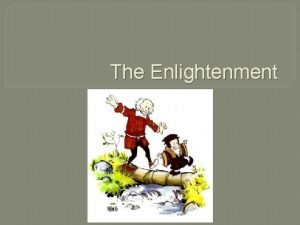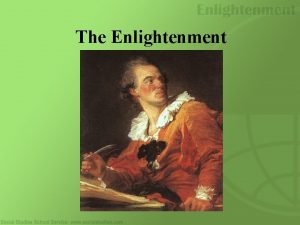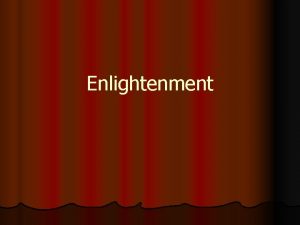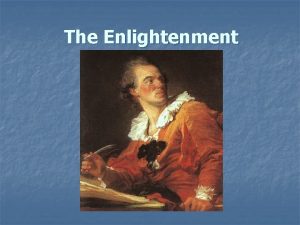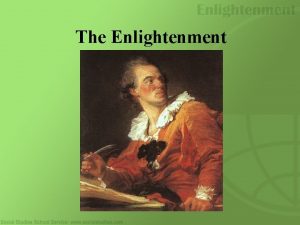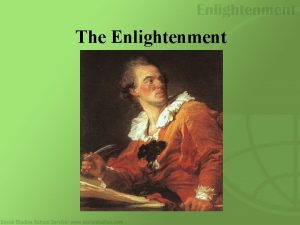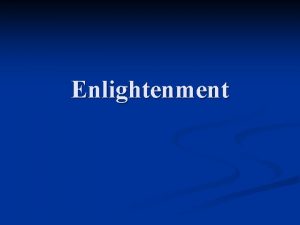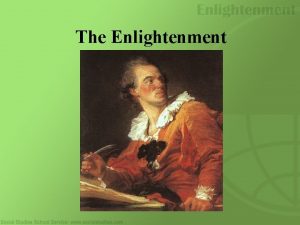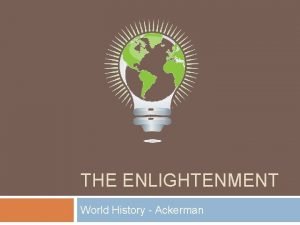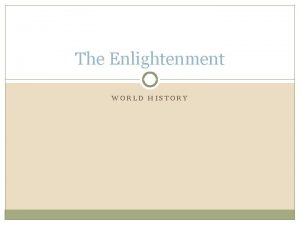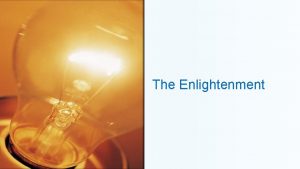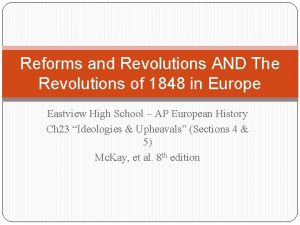REVOLUTIONS AND ENLIGHTENMENT WORLD HISTORY MR ALLEN ESSENTIAL






























- Slides: 30

REVOLUTIONS AND ENLIGHTENMENT WORLD HISTORY MR. ALLEN

ESSENTIAL QUESTIONS FOR UNITS 1 AND 2 –DEVELOPMENT OF MODERN POLITICAL THOUGHT n n n 1) Why do people form societies? 2) What is more important, the good of the individual or the good of society? 3) Should people be able to choose who governs them? 4) What type of government would be best for you? 5) Is religion a force for good in society? (We will revisit) –Enlightenment/Jesus

THE REVOLUTIONS 3 Great political events at the end of the 17 th and 18 th centuries Glorious Revolution-King held accountable to the people’s representative body (Constitutional Monarchy) n American Revolution - “No taxation without…” n French Revolution – Anarchy to Dictatorship n

Louis XIV bankrupted France!!! n King Louis XIV of France (r. 16431715 “The Sun King”

DIVINE RIGHT OF KINGS n Monarchs did not consider themselves accountable to their citizens, but only to god “I am the State” -Louis XIV n

Palace of Versailles n Built 1671 -1682 by King Louis XIV Shows how out of touch and insincere King Louis XIV was towards his subjects

When a ruler spends this much on his own personal palace, what can we infer about his country?

Magna Carta 1215 – The King’s power is not absolute! n n n King John I fought costly unsuccessful wars with France and these wars led to raised taxes in England Angry English nobles rebelled and forced John to recognize their political and civil rights The Magna Carta recognized right to trial and no taxation without consent

England’s legislative branch. Elected law makers who discuss And vote on potential laws; work with the King.

Glorious Revolution 1689 -Battle over which institution would dominate England ● English did not want a Catholic king. English lords invited William of Orange to take throne without bloodshed 1689 Parliament crowns William and Mary co-rulers of England ● Turning point in England’s history: ● Proves that power is now in the hands of Parliament, not the king!

Constitutional Monarchy ● England was now a Constitutional Monarchy: a kingdom with a constitution to check the powers of the king and protect the rights of the citizens ENGLISH BILL OF RIGHTS STATED: No royal interference with parliament Freedom of speech

John Locke 1632 -1704 n British Philosopher n Believed all people were born with 3 natural rights (Life, Liberty, Property) n

John Locke n In the State of nature people could not protect their rights well. n Humans agreed to a Social Contract where government would protect the rights of the people, and the people would act reasonably toward the government. n If government broke these agreement, the people could rebel

The Age of Enlightenment 1700 s-1800 s "New opinions are always suspected, and usually opposed, without any other reason but because they are not already common. “ -Locke

The Age of Enlightenment n The Enlightenment, a philosophical movement beginning in France that advocated Reason and logic as the basis of authority and all decisions and using reason and logic to solve social problems

THE ENLIGHTENMENT n Centered in Paris, in salons, drawing rooms of the wealthiest urban classes. n Guests gathered to discuss ideas-Coffee replaces beer as the daytime drink of choice. Growth of reading n Philosophies wanted to be like Isaac Newton, who’s discoveries in math and astronomy suggested natural laws

Voltaire 1694 -1778 n n French Philosopher Was opposed to organized religions criticizing other faiths and practitioners n Did believe in freedom of religion n Staunch supporter of individual liberties, after his exile to England

Voltaire n Staunch supporter of right to a fair trial Heavily influenced leaders of the French Revolution n Was opposed to censorship: "I disapprove of what you say, but I will defend, to the death, your right to say it. "

Baron Montesquieu n n n 1689 -1755 French Philosopher Believed government’s power needs to be checked

Baron Montesquieu n Separation of Powers n Believed power in government had to be divided amongst different branches Believed checks and balances are necessary to keep one branch from becoming too powerful Believed the people needed safeguards from government becoming too powerful n n n Heavily influenced America’s founding fathers 1770’s-1780’

Thomas Hobbes n Believed human beings were naturally wicked n Believed human beings could not be trusted to make decisions to benefit all, only to benefit themselves n Believed an absolute monarch was necessary to protect human beings from each other (Humans not capable of self rule)

Hobbes: Leviathan and Social Contract n Wrote Leviathan 1651 n Argued that the people and the leader had a Social Contract n Argued that the only way to avoid war, chaos, disarray was a strong central ruler n Hobbes’ Social Contract: people give up their rights to an absolute ruler in exchange for protection, law, and order. People do not have the right to rebel

TURN TO A PARTNER n Hobbes believed human beings were self interested and could not make decisions to benefit society. Therefore, we need an absolute ruler. n Do you agree?


Jean Jacque Rousseau n Believed in Education n Wrote that an informed society could make good decisions n Blamed societies' evil on the uneven distribution of property in the world

THE SOCIAL CONTRACT n Built on Locke’s Social contract-Man adopted laws to preserve their property. In doing so they become enslaved by government and tricked by the wealthy. n People should not be able to follow their own self interests, and society should be governed by the general will (Majority will) n The General will is always right, so citizens should be forced to obey.

Rousseau’s Social Contract n The Social Contract: published 1762 n Believed that the people are the source of government powers n Believed government’s job was to help people be happy and needs cared for n Believed if government did not do its job people had the right to remove leaders, rebel

Mary Wollstonecraft n n n Argued that society trains women to be weak and more concerned with their superficial looks than contributions to society Argued that women should receive the same type and quality of education as men Argued it was a problem that men were so comfortable with treating women as inferiors

Mary Wollstonecraft n n n Argued that society trains women to be weak and more concerned with their superficial looks than contributions to society Argued that women should receive the same type and quality of education as men Argued it was a problem that men were so comfortable with treating women as inferiors

The American Enlightenment • James Madison • Father of the Constitution! • “Separation of Powers” • Thomas Jefferson • Used ideas from John Locke (Natural Rights) • Life, Liberty and the Pursuit of Happiness (in Declaration of Independence)
 How were european rulers guided by enlightenment thought
How were european rulers guided by enlightenment thought Jose de san martin definition world history
Jose de san martin definition world history Schlafgedicht
Schlafgedicht Enlightenment definition world history
Enlightenment definition world history Revolutions and national states in the atlantic world
Revolutions and national states in the atlantic world Enlightenment essential questions
Enlightenment essential questions Ap world history chapter 25 africa and the atlantic world
Ap world history chapter 25 africa and the atlantic world Characteristics of lipids
Characteristics of lipids History world tour
History world tour Revolutions in europe and latin america section 1 quiz
Revolutions in europe and latin america section 1 quiz Lesson 2 nationalism and political revolutions
Lesson 2 nationalism and political revolutions First and second industrial revolutions
First and second industrial revolutions Four great revolutions in thought and religion
Four great revolutions in thought and religion Revolutions in europe and latin america
Revolutions in europe and latin america Four great revolutions in thought and religion
Four great revolutions in thought and religion Reforms revolutions and war answer key
Reforms revolutions and war answer key Wars revolutions and reforms
Wars revolutions and reforms Atlantic revolutions and their echoes
Atlantic revolutions and their echoes Chapter 8 nationalist revolutions sweep the west
Chapter 8 nationalist revolutions sweep the west Chapter 30 revolutions in russia
Chapter 30 revolutions in russia Chapter 14 section 1 revolutions in russia answer key
Chapter 14 section 1 revolutions in russia answer key Which ideas of romanticism would encourage nationalism
Which ideas of romanticism would encourage nationalism Atlantic revolutions in a global context
Atlantic revolutions in a global context First agricultural revolution ap human geography
First agricultural revolution ap human geography Latin american revolutions date
Latin american revolutions date Atlantic revolutions dbq
Atlantic revolutions dbq 22 revolutions
22 revolutions Chapter 17 revolutions of industrialization
Chapter 17 revolutions of industrialization Building revolutions
Building revolutions Why did the 1848 revolutions fail
Why did the 1848 revolutions fail Europe faces revolutions
Europe faces revolutions
